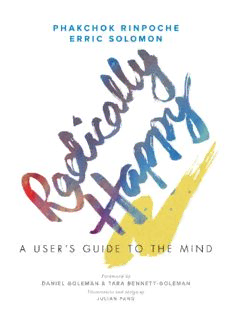
Radically Happy: A User’s Guide to the Mind PDF
Preview Radically Happy: A User’s Guide to the Mind
Shambhala Publications, Inc. 4720 Walnut Street Boulder, Colorado 80301 www.shambhala.com © 2018 by Phakchok Rinpoche and Erric Solomon All rights reserved. No part of this book may be reproduced in any form or by any means, electronic or mechanical, including photocopying, recording, or by any information storage and retrieval system, without permission in writing from the publisher. Ebook design adapted from printed book design by Julian Pang LIBRARY OF CONGRESS CATALOGING-IN-PUBLICATION DATA Names: Rinpoche, Phakchok, 1981– author. | Solomon, Erric, author. Title: Radically happy: a user’s guide to the mind / Phakchok Rinpoche and Erric Solomon; graphics by Julian Pang. Description: First edition. | Boulder: Shambhala, 2018. | Includes bibliographical references. Identifiers: LCCN 2017049452 | ISBN 9781611805277 (pbk.: alk. paper) eISBN 9780834841888 Subjects: LCSH: Buddhism—Psychology. | Happiness—Religious Aspects—Buddhism. | Mindfulness (Psychology) | Meditation—Buddhism. Classification: LCC BQ4570.P76 R56 2018 | DDC 294.3/444—dc23 LC record available at https://lccn.loc.gov/2017049452 v5.3.2 a May our precious teachers’ aspirations for the welfare of beings swiftly come to pass. May all be free from suffering and have all the causes for radical happiness. This book is dedicated to the contentment and well-being of everybody, everywhere. CONTENTS Foreword by Daniel Goleman and Tara Bennett-Goleman INTRODUCING RADICAL HAPPINESS 1 Why You Need Radical Happiness, or How to Be Less of a Dog and More of a Lion 2 The Looking-for-Happiness Conundrum 3 The Indispensable Basis of Happiness: Getting to Know Your Mind PART ONE BASIC HAPPINESS—MASTERING THE MIND 4 Always React to Thoughts the Same Way 5 Relax the Comparing 6 Be Present A Daily Plan for Basic Happiness PART TWO INTERCONNECTED HAPPINESS—MASTERING YOUR HEART 7 Contemplate the Interdependent Nature of Reality 8 Relax the Judging 9 Be Attentive A Daily Plan for Interconnected Happiness PART THREE RADICAL HAPPINESS—MASTERING DIGNITY 10 Cultivating Dignity 11 Relax the Clinging 12 Be Aware A Daily Plan for Radical Happiness Afterword Acknowledgments List of Exercises Notes About the Authors About the Designer E-mail Sign-Up FOREWORD I f we look within ourselves with some perspective, we might see how our mind can be like a wild monkey. Left to its own whims, the mind can, in an instant, take off in any direction—here one second, there the next. How can we take more control? Operating manuals for the mind have existed for millennia, particularly in Asian cultures. These have been meditation instructions—pithy bits of advice for the monks, nuns, and yogis who devoted their lives to these practices. Typically secret, they were not shared beyond the small circle of these hard-core practitioners. Fast-forward to the twenty-first century. Brain scans of Olympic-level meditators show how much their minds have shifted in beneficial ways from this inner workout; meditation, it turns out, operates like a mental fitness workout. And neuroplasticity explains how working a given mental circuit, the essence of meditation practice, makes those neuronal links stronger. The data points to a dose–response relationship, where the more time you put in, the stronger the benefits are. And these show up from the very start. The need has never been greater. Since these ancient methods were first practiced, everything has changed. Indeed, the sheer velocity of change—social, technological, cultural—escalates hourly, it seems, a torrent that demands we continually adjust to newness. Our heads spin. So it’s no surprise that millions now seek some inner peace through the pursuit of meditation. This mental workout comes in a myriad of forms, some highly effective, others not so. But meditators or not, we all need an easy-to-use, pragmatic operator’s manual for the mind. You’ve found it here. Consider the authors. We’ve known them both for many years and can attest to the depth of their knowledge and their empathy with our predicaments. Phakchok Rinpoche hails from a long line of meditation masters. His grandfather Tulku Urgyen was one of the greatest meditation masters to emerge grandfather Tulku Urgyen was one of the greatest meditation masters to emerge from old Tibet in the 1950s. And Tulku Urgyen’s great-grandfather Chokgyur Lingpa was legendary throughout nineteenth-century Tibet as a revealer of great wisdom teachings. Phakchok Rinpoche himself was recognized as the reincarnation of yet another great Tibetan master. And yet, as you’ll see in Radically Happy, Phakchok Rinpoche lives much like the rest of us and so can draw on his own doubts, anger, and other familiar feelings to illustrate ways we can each find steadier footing in the rocky realities of our lives. His earthy tales of dealing with life’s stuff mix with his remarkably clear and accessible instructions—heart advice for navigating the tricky shoals of our own mind. Erric Solomon adds a different wealth of expertise. Mastering the craft of software writing at a young age, he spent years as an executive in the high- pressure world of Silicon Valley. At the same time, Erric Solomon became a serious practitioner of Tibetan meditation. He speaks in the no-nonsense voice of a techie but with the clarity of a seasoned practitioner, presenting mind-training methods in a way that resonates with our wired world. Both Phakchok Rinpoche and Erric Solomon have the gift of using rich and humorous examples from their own lives to make their points. The net result: a user-friendly guide to understanding how to work with our mind. Daniel Goleman and Tara Bennett-Goleman
Description: